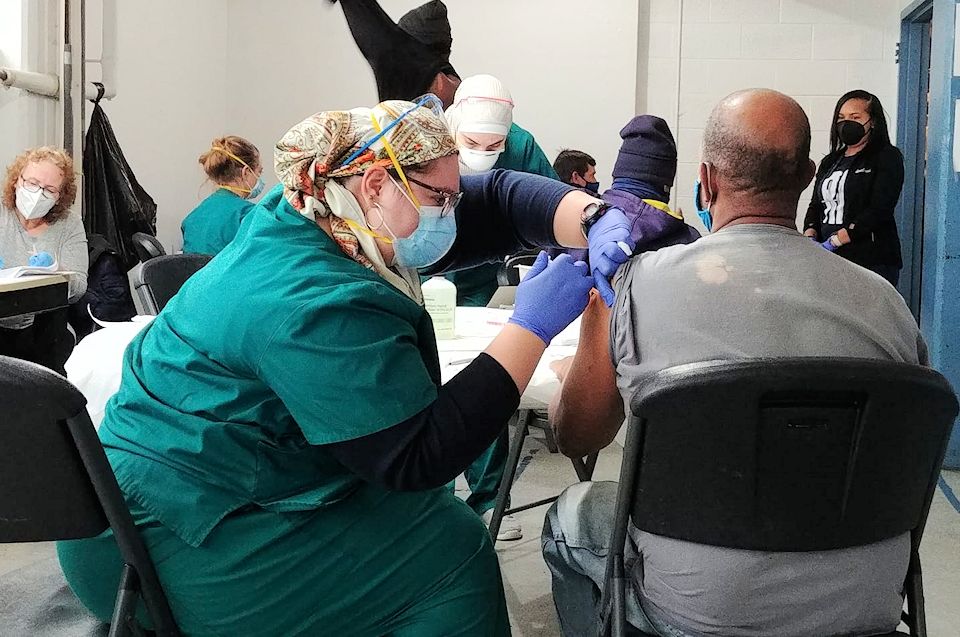John Wesley taught that faith is meant to be practiced together. United Methodists’ shared mission of making disciples of Jesus Christ for the transformation of the world expands our connection.
RYAN DUNN
United Methodist Communications
Jesus prays in John 17 that we “may all be one.” His prayer is for us to be models of community and connection.
When founding Methodist John Wesley taught, “The gospel of Christ knows of no religion, but social; no holiness but social holiness. Faith working by love is the length and breadth and depth and height of Christian perfection,” he reminded us that our faith is to be practiced together (Hymns and Sacred Poems (1739), Preface, page viii).
When we live into our mission of “making disciples of Jesus Christ for the transformation of the world,” our shared mission pushes us towards expanding our connection.
This is disruptive work. Many obstacles impede our oneness: racism, exceptionalism, prejudice based on class or poverty, and other practices of exclusion. Our call as United Methodist followers of Jesus is to disrupt the forces of separation.
There are great examples of local churches engaging in the mission of social holiness in our United Methodist connection.
Loving neighbors
One of the Tiffany stained-glass windows at Cass Community United Methodist Church reads, “God is Love.” When this church in Detroit, MI, was facing possible closure, leadership decided to share God’s love by intentionally ministering to the surrounding neighborhood.
Today, the church sponsors Cass Community Social Services, an agency providing food, housing, health services, and jobs programs. They combined their mission to provide a sense of relational value to the people around them with a sense of stewardship for God’s creation, creating a jobs program that marries jobs with sustainability. Cass Community Social Services also provides a day program for adults with developmental disabilities, reflecting the congregation’s statement of welcome: “We strive to make the environment of Cass Community United Methodist Church as safe and welcoming as it can possibly be.”
Being with the community
The core platform of ministry at Haywood Street Congregation in Asheville, North Carolina, is the act of “being with.” Haywood Street lives their mission through a free community lunch, a respite center for homeless adults, worship services scheduled and programmed around the schedules of the community’s times of need, and a clothing closet. While many churches offer similar programs, Haywood Street’s mindset differs a little bit.
“The invitation is to come here to receive rather than to fix,” said founding pastor Brian Combs, “everyone here is open-handed to receive.” This means that all participants receive before they serve, regardless of background or wealth. Because grace has no boundaries, they practice a “scandalous” generosity, giving to all with open hands.
Customers of their clothing closet may take as much as they need, the congregation cultivates a free community garden, and their transitional housing boasts leather recliners and flat-screen TVs. All this is done so everyone feels a sense of belonging and value to the family of God.
Visiting the prisoner
Crossroads United Methodist Church in Compton, California, was a small, older congregation when they began running expungement clinics. “Our theological foundation is Matthew 25:35-40 … ‘I was in prison and you visited me,’” said Pastor Adrienne Zackery. “Churches need to be safe places that do not judge.”
When Crossroads UMC learned the state of California was releasing 3,500 people from prison, they pulled together hygiene kits for those leaving the facilities. They hoped the kits would communicate a sense of openness and belonging to the individuals returning to the community. For Crossroads, communicating hospitality and individual worth is a priority.
Seeing God in others
LifeLine Toledo (Ohio) exists “to create an organic, missional, spiritual community in Toledo, and to help lift the city out of poverty.” They want to affirm the Imago Dei (image of God) in every person, implying that relationships are the cornerstone of their ministries. Community dinners provide key points of connection for LifeLine.
The dinners provide space for “people with no jobs and people who are CEO’s, and everything in between.” LifeLine believes that community is the embodiment of the Gospel. So their social encounters are expressed as living encounters with God’s kingdom.
Our global mission
Nearly all United Methodists participate in like-minded services of disruption through their support of the Global Ministries of the United Methodist Church. As Gandhi said, “There are people in the world so hungry that God cannot appear to them except in the form of bread.”
Many of our global missions focus on representing God’s presence and acceptance through provision of basic human needs. United Methodists support efforts to provide water and sanitation for all while providing necessities through the United Methodist Committee on Relief for areas stricken by natural disaster. Connection is at the core of Global Ministries as they provide a witness to God’s ever-present grace while connecting United Methodists in service to others.
Last Updated on April 27, 2021

